The big chasm: the PM, business and the Greens
Anthony Albanese’s ‘safe change’ agenda won him the 2022 election and it is the guiding light of his approach as PM. But it’s not going to cut it.
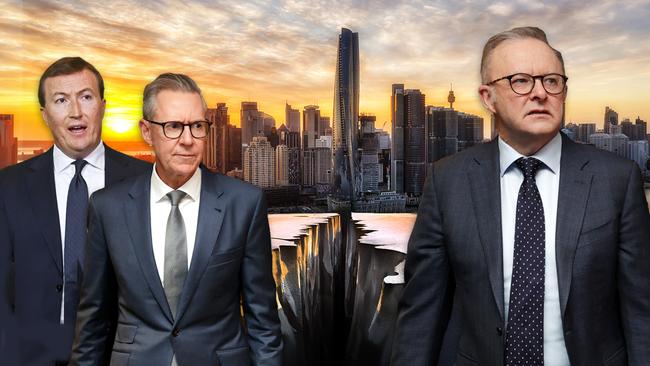
The conflict between the Albanese government and the business lobbies is part of a far broader dispute that has plagued Australia for decades – the collapse of the once golden dictum that good policy is the road to good politics.
The economic reform wreckages of past political leaders fill the landscape – John Howard’s WorkChoices, Julia Gillard’s carbon tax, Tony Abbott’s spending reduction budget, Bill Shorten’s tax redistributions from 2019 – the lesson being that brave and bold is often the road to political extinction.
Anthony Albanese has lived by the defining slogan of “safe change”. It won him the 2022 election and it is the guiding light, with some exceptions, of his approach as Prime Minister. It isn’t a rejection of reform. But it means reform is framed by Labor’s political ethos and needs – nothing too dangerous, nothing too adventurous. Albanese has watched the long succession of extinguished political leaders and decided he won’t fall the same way.
The trouble for Albanese, however, is that “safe change” is a political construct that doesn’t work for the economic challenge Australia now faces. The problems of collapsed productivity, negative per capita income growth, inadequate investment, sticky inflation and weak real wages demand circuit-breaking politics and bold policy.
“Safe change” doesn’t cut it – yet “safe change” is Albanese’s re-election strategy. You can guarantee he will stand by the model. He devised the model after Labor’s 2019 election defeat; it is endorsed by his colleagues; it has become the Labor way; it is the best description of how Albanese governs. Having been successful in 2022 against Scott Morrison, he will offer the same model, upgraded at the margins, in 2025 against Peter Dutton.
Of course, “safe change” as envisaged by Labor doesn’t correspond with other people’s view of “safe change”. For example, the business lobbies see Labor’s industrial relations laws more as reckless change; the Coalition sees Labor’s renewables energy strategy as dangerous change; while many economists see the growth of big government and big spending as high-risk change.
Yet these policies are absolutely integral to the Labor political model as it has evolved since the Rudd-Gillard era. It rests upon Labor’s ongoing credentials as the climate change transition party, its fidelity to the trade union movement, its belief in government intervention as an economic growth and productivity-boosting catalyst, its support for social spending, its commitment to an expanding care economy including aged care, healthcare, childcare and the NDIS, and its strong environmental profile.
But Albanese believes in a “let’s work together” mantra. As ALP leader, he conspicuously ditched the big-end-of town, bank bashing, class warfare rhetoric adopted by his predecessor, Bill Shorten, along with the tax-raising policies of Shorten and his shadow treasurer, Chris Bowen. Albanese wants to be a friend or honest broker in dealing with big and small business and the mining industry.
How did he respond this week to the frontal assaults by the Business Council of Australia leaders? He offered the olive branch of denial. Albanese praised the BCA for its involvement in debate, declared his optimism that Labor and business can work on reform together, and said his government was “proudly pro-business and pro-worker”. In short, no problem, nothing to see here. Decoded, Albanese doesn’t think business can hurt him.
But that misses the big point. For Labor, the ultimate issue is whether its “safe change” agenda will actually work and deliver the productivity, investment and living standard gains that Albanese promises. This is the “make or break” test that determines Labor’s survivability. The danger for Albanese is not that big business attacks him – it is that private sector capital says his policies are failing and won’t work.
That’s the heart of Labor’s problem. It reveals Labor’s near desperation to see the Reserve Bank cutting rates before the election – the suspicion, however, is that Labor exaggerates the likely electoral gains from the bank starting to reverse the cycle.
This week the icons of big capital issued a preliminary “no confidence” declaration on the PM but extended the critique to the political system. Giving his first annual dinner speech as BCA president, Geoff Culbert said: “Why would anyone want to invest in Australia where even a modicum of success is criticised? Why would anyone want to invest in a country where a 4 or 5 per cent profit margin gets you an accusation of price gouging and a call up for disinvestment? To paraphrase Ronald Reagan, the narrative for doing business in Australia cannot be ‘If it moves, tax it. If it keeps moving, regulate it. If it stops moving, subsidise it.’ But that is the direction we’re heading.”
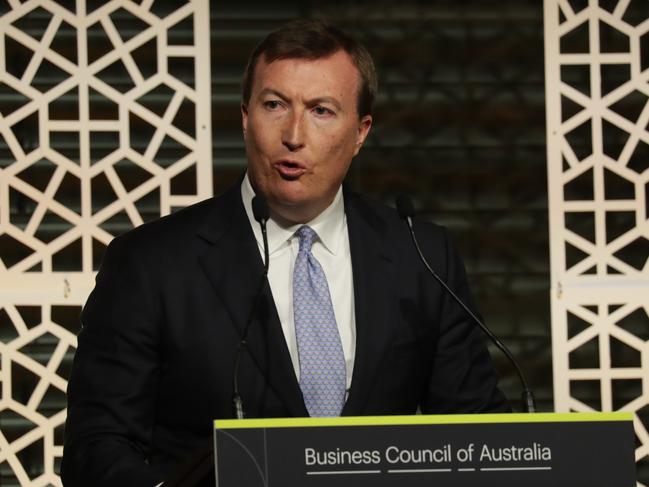
BCA chief executive Bran Black told the dinner: “Rather than feeling confident in our growing national prosperity, many CEOs feel we are losing our way. Instead of taking the big steps on the things that matter, we are taking incremental – but noticeable – steps backwards. The upshot is best illustrated by the fact that I now have members – major employers – who are now actively choosing to invest overseas rather than in Australia.”

He said Labor’s multi-employer bargaining laws must be abolished. He attacked the Greens’ “so-called Robin Hood proposals to impose even greater taxes on our success”. Bran called for less red tape, more flexible workplace laws, simpler planning systems and a more efficient tax system, saying he knew such steps were “painfully hard and come with electoral risk”.
“We’re past the opportunity for incremental steps,” Black said. “So the only thing that will matter is bold steps in policy.” He warned that nothing proposed by “any side of politics” would reverse the economic decline warned about in last year’s Intergenerational Report.
The critiques of Culbert and Black were not confined to Labor – they applied to all sides of politics and went to the cultural debasement of our politics. Culbert said populism was undermining “meaningful long-term reform” and the “prosperity of the nation”. It promoted “short-term thinking and blame-shifting” and created a wedge “that gets exploited by minority interests”. But he had the honesty to concede that some of the hostility towards business was “self-inflicted”.
Culbert said 20 years ago, then BCA president Michael Chaney identified reforms to tax, workplace relations, regulation and red tape as the keys to higher productivity – but “we’re still talking about those same issues today”.
Exactly. Where, pray, will the country be in another 20 years? Still mired in the same grievance politics? The truth is the Hawke-Keating era is over for Labor. It’s gone. It’s not coming back. Labor won’t embrace the BCA agenda and the BCA has no strategy to persuade the government.
The reform agenda of the Albanese government is limited and modest because the politics are so hard, the power of the negative is too great, because Labor’s primary vote is just 32 per cent and because it has few real allies in the ranks of private sector capital. The chasm is too wide. Both Labor and business talk past each other.
Business is doomed to more frustration. That’s because the centre-left dominates Australian politics and has the numbers in both the House and Senate, a situation unlikely to change at the next election. Albanese’s political strategy of “safe change” means he will shun the major tax reform, workplace relations, red and green tape reform, advocated by business and many economists – but at the same time steer clear of the growing radicalism of the Greens and the left of politics, with Dutton poised, waiting to snap the trap on Labor’s lurch to the left.
You cannot miss the signals. Albanese told the BCA Labor won’t compromise on its new IR laws – they’re non-negotiable. When pressed by the ABC’s Patricia Karvelas about negative gearing and capital gains tax reform, he said the people voted on this in 2019 and “they were rejected” – hint, they’re too risky. Asked about the Productivity Commission report on childcare – a defining element of “safe change” – Albanese sounded as though he would be more ambitious on this spending agenda.
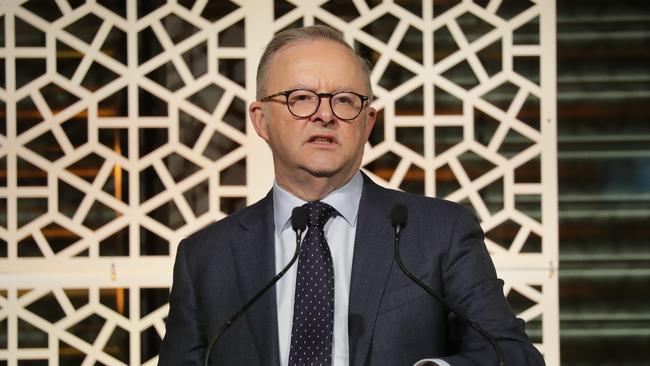
Under questioning, he dismisses the Greens’ demand for a “climate trigger” in environmental laws – that would constitute political war with the mining sector.
At the same time Albanese told the BCA he ran an “economic reform” government – witness fixing the NDIS, the Labor-Liberal compact on aged care, the Future Made in Australia agenda, childcare investments already sealed, fee-free TAFE places, reopening China exports, piloting the energy transition, rolling out renewables and paid parental leave, among others.
The game plan is apparent – negotiate a narrow, middle course, keep reinterpreting how “safe change” best functions. Yet the polls show political attrition is taking its toll. Albanese is now fighting on two fronts – the Coalition on the right and the Greens on the left. That’s lethal, a situation that further limits his policy flexibility.
The Labor veterans are getting restless. Former ACTU secretary Bill Kelty was reported in the Financial Review saying the Albanese government was “mired in mediocrity” and said “We need a Labor Party in which the big issues are confronted”. In this week’s Barry Jones Oration, former Labor foreign minister Gareth Evans attacked the Albanese government for political timidity and said: “One can’t avoid the impression that more and more people are asking, what exactly is this Labor government for?”
Evans said: “It’s time for the party leadership to recover its mojo and tell them.”
Given these views of Kelty and Evans, can you imagine what Paul Keating really thinks? In effect, the accusations of the veterans go to both politics as well as economics – their message is that caution and timidity isn’t working in political terms, let alone economic terms.
While their critique seems largely justified, there is a missing element. The critics are weak on spelling out how the policy changes they advocate will succeed in today’s climate rather than terminate the government. Indeed, some of the general suggestions they put forward seem to be guarantees of electoral suicide.
Having attended over the past fortnight both the Minerals Council and BCA annual dinners, the sense of gloom was unmistakeable about the prospect of a minority government after the 2025 election. And this raises a bigger test for the nation: if a fractured political system means either governments with a narrow majority or minority governments, how compatible is such politics with a growth agenda and rising living standards for the Australian people? A minority Labor government would be a major setback for Albanese. Remember, after his 2022 election victory he was singing with optimism about a long-term ALP government. Minority government after just one term wasn’t in the plan.
Any minority Labor government means the Greens will exert even more leverage over legislation, with potentially alarming consequences. Labor-Greens relations have sunk into a frame of hostility and that’s unlikely to change.
Asked this week about the Greens becoming an even more influential political force in the country, former BCA chief Jennifer Westacott was outspoken. She said: “The Greens’ policy agenda is reckless and dangerous. It falls outside the boundaries of acceptable public policy and is not in the national interest.
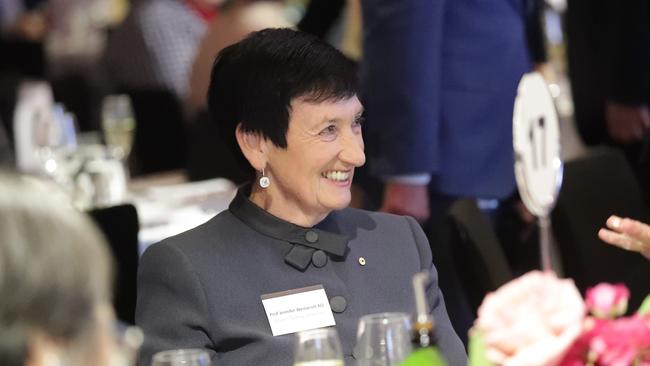
“The reason I am so concerned is that if these ideas force their way into the mainstream policy agenda, it would be a massive retrograde step for the nation’s growth, innovation and prosperity. The consequences would fall on the lowest paid, most vulnerable people in our society who are always impacted the most by policies that lock in low-growth and low productivity and fray social cohesion.”
Westacott’s statement takes alarm about the Greens on to a new plateau of economic and moral concern. How long before influential Australians follow Westacott and display the courage to speak out about the damage the Greens constitute to Australia’s economic and social fabric, given their numbers in the parliament, their fanning of anti-Semitism in Australia, their tolerance, even backing, of violent acts and demonstrations, and the support they have paradoxically drawn for a long time from the tertiary educated and professional class?
One of the astonishing aspects of the nation’s progressive media has been its refusal over many years to probe what the Greens actually represent and believe, as documented in public statements and in their charter. But that is getting far harder to ignore.
The Greens, in attacking Labor’s legitimacy as a party of the left, have moved to embrace a broad-based agenda that seeks a $514bn big corporations tax over a decade; they oppose the Labor-Liberal laws for direct action to try to hold the criminals in the CFMEU to account; they demand the Reserve Bank cut interest rates and imply the government should override the bank to achieve this; they accuse major companies of price gouging and fanning inflation; they call for greater government control of prices and more state ownership, witness the demand for a freeze on rents; they support a net-zero emissions policy to be achieved by 2035, along with no new gas or coal development; they are dangerous in their undermining of social cohesion in Australia; they oppose the AUKUS agreement, are hostile towards the ANZUS alliance with the US, and call for reparations and sovereignty for First Nations Peoples.
The Greens are not just a rival force to the Labor Party but a risk to the nation’s policies and values on a scale unprecedented for many decades. The 2025 election will be vital, not just for determining who governs but for the battle on the left of politics between Labor and the Greens.
The gulf between the policy stances of the Greens and our business lobbies suggests a nation destined to become more polarised. In this paper on Friday, Bill Kelty recalled a phase of history and co-operation that now seems a foregone era. Kelty described how as ACTU chief he worked with a range of business figures such as George Polites, Peter Abeles, Ted Harris and Bert Evans among others to re-shape the nation’s direction in the 1980s under the Hawke-Keating era.
Kelty said: “I am always surprised that people don’t believe that there can be a constructive relationship between people who represent different economic interests.” That’s the pivotal point – but there’s not much of that left these days.
Albanese told the BCA that his government was “delivering in very difficult economic times”. He said economic reform was not confined to “a vanished golden age”. And he told the ABC while some people “romanticise the past”, his job was to govern in the present. He is right that governing today is far more difficult than governing in the past. Having conceded that, Albanese needs to take “safe change” and bend the boundaries a hell of a lot more.


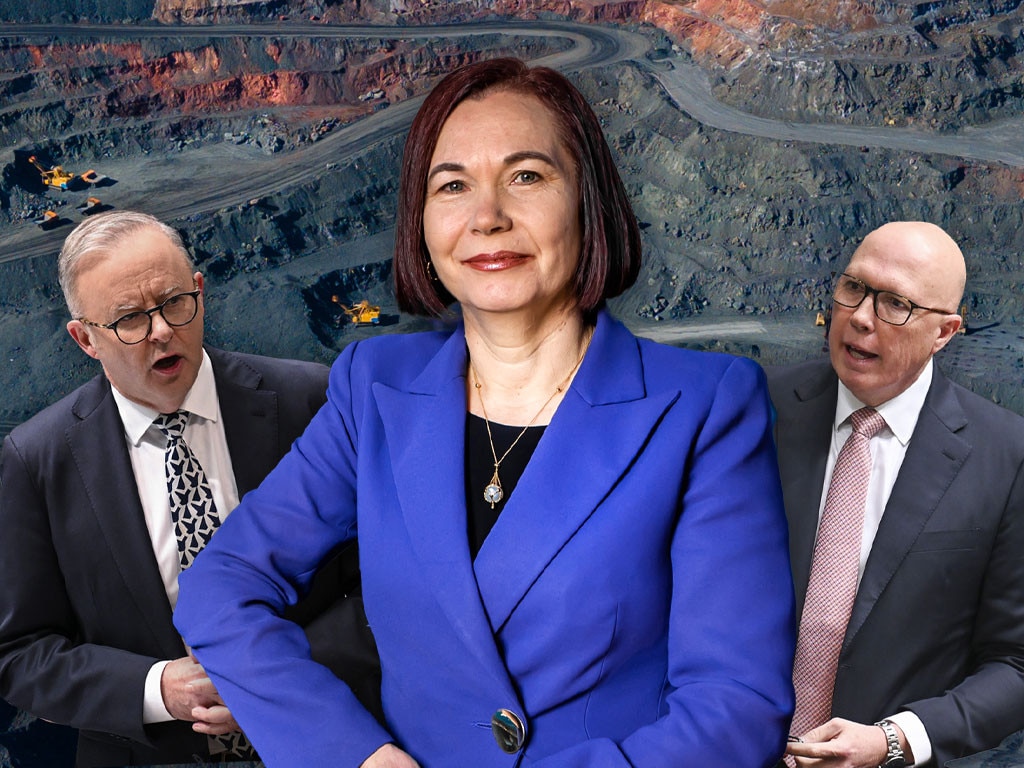

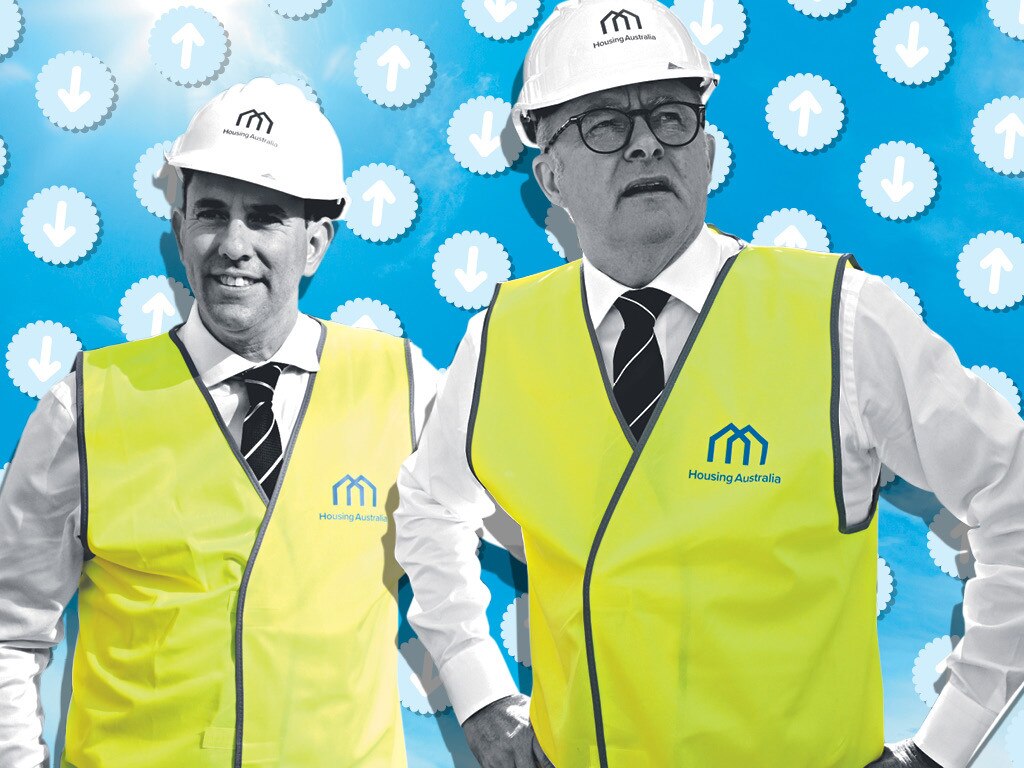
You can now listen to The Australian's articles. Give us your feedback.